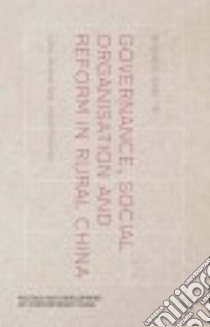Governance, Social Organisation and Reform in Rural China - 9781137484680
Un libro in lingua di Hongguang He edito da Palgrave Macmillan, 2015
- € 96.80
- Il prezzo è variabile in funzione del cambio della valuta d’origine
Xiaogang village, located in Anhui Province, was reputedly the first village in China to decollectivise in 1978, paving the way for agricultural reform and a new rural economy in China. This study explores how farmers in Xiaogang have engaged in various forms of cooperation in the decades since decollectivisation and the extent to which changing political and social contexts of the rural China are likely to impact upon the way in which farmers cooperate and collaborate with each other. In an attempt to understand the relationship between farmers and the state in a rapidly changing China, the text focuses upon governance and social organisation within the village and explores the extent to which farmers have autonomy in both their economic and political activities.
While decollectivisation is often interpreted as the second 'liberation' of Chinese farmers, it is clear that new power structures have emerged to replace those of the collective and the commune. While many studies have explored this question in terms of a so-called binary opposition between the state and the community, they have tended to neglect the subtleties behind this opposition. Utilising Foucault's concept of 'governmentality', this study develops new ways of understanding micro-level power relations that enable and constrain certain forms of political and economic activity within the village.
While decollectivisation is often interpreted as the second 'liberation' of Chinese farmers, it is clear that new power structures have emerged to replace those of the collective and the commune. While many studies have explored this question in terms of a so-called binary opposition between the state and the community, they have tended to neglect the subtleties behind this opposition. Utilising Foucault's concept of 'governmentality', this study develops new ways of understanding micro-level power relations that enable and constrain certain forms of political and economic activity within the village.
Informazioni bibliografiche
- Titolo del Libro in lingua: Governance, Social Organisation and Reform in Rural China
- Sottotitolo: Case Studies from Anhui Province
- Lingua: English
- Autore: Hongguang He
- Editore: Palgrave Macmillan
- Collana: Palgrave Macmillan (Hardcover)
- Data di Pubblicazione: 04 Febbraio '15
- Genere: POLITICAL SCIENCE
- Argomenti : Village communities China Anhui Sheng Case studies Social structure China Anhui Sheng Case studies Land reform China Anhui Sheng Case studies
- ISBN-10: 1137484683
- EAN-13: 9781137484680


